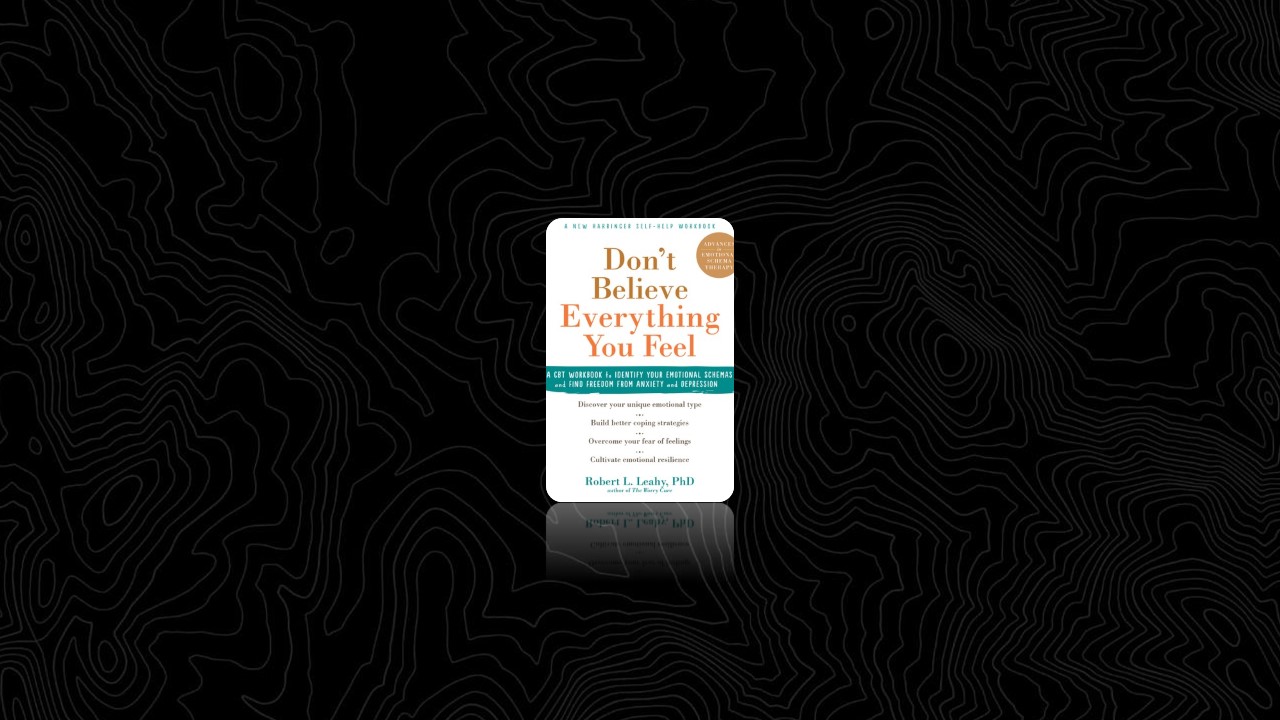What Are Emotions?
Feelings mean that you are alive.
Thoughts and feelings are different.
Thoughts can lead to feelings and feelings can lead to thoughts.
Keep track of your emotions and notice the most unpleasant and pleasant.
Keep track of what triggers your emotions.
Emotions have five parts: sensations, beliefs, goals, behaviors, and interpersonal tendencies.
Each one of these five parts of your feelings can be a target for change.
Validating Your Feelings
Crying is part of human existence.
We can feel comforted by others when we are suffering.
Validation helps us realize that others care and that we are not alone.
You can validate yourself.
Look for examples of compassion around you—in the present and the past.
Direct compassion toward yourself.
Realize that every feeling you have is shared with all the human race.
Notice acts of kindness in others.
Direct compassion and kindness toward yourself.
Thinking About Your Emotions
How we think and act when we have an emotion can make things better or worse.
Emotional schemas are our beliefs about emotions and our strategies for coping with them.
If you believe that your negative emotions will last indefinitely, go out of control, or don’t make sense—or that you are different from everyone—then you are more likely to become anxious and depressed.
If you believe other people have the same feelings that you have, that feelings come and go, and that you can tolerate mixed feelings, you are less likely to be upset about your feelings.
Your negative emotions will get worse if you use problematic strategies to cope with these feelings.
These problematic strategies include worry, avoidance, blaming, substance misuse, binge eating, and complaining.
The Emotional Schema Approach
Emotions warn us, tell us about our needs, and connect us with meaning.
Strong emotions can lead us or mislead us.
Beliefs about emotions can make it difficult for us to tolerate our feelings.
Strategies for coping with our emotions can make matters better or worse.
Emotional realism means that you won’t have perfect happy feelings all the time.
Inevitable disappointments mean that everyone is disappointed. Normalize this.
Constructive discomfort means that you will make progress if you are able to tolerate discomfort.
You can’t just do what you want to do if you want to get what you want to get.
Successful imperfection means that you can make progress acting imperfectly.
Flexible satisfaction means that you need to be open to a range of possibilities to experience satisfaction.
My Emotions Will Go on Forever
When you think your emotions will go on indefinitely, you feel helpless, hopeless, depressed, and more anxious.
Your belief in the permanence of emotions leads you to avoid experiences that could help you cope better.
We tend to overpredict how intense and permanent our emotions will be.
Evolution built in this tendency to overpredict in order to help us escape from danger. But we are no longer facing the dangers our ancestors faced.
Get into a time machine and go to the past and the future to notice how your emotions change.
Think back to your emotions in the past and why they changed.
Think ahead to your Future Self. What advice would that self give you now about the way you feel?
What might help you cope better in the future?
I Feel Guilty About My Feelings
friends, and partners. Think about the messages and myths that you learned.
Sometimes we learn that certain emotions are bad to have, and then we feel ashamed and guilty about our feelings.
Feelings are not the same thing as choices. You can feel angry without acting in a hostile way.
Feeling guilty about an emotion intensifies that emotion and makes us more anxious.
My Emotions Are Out of Control
We all have biases and distortions in our thinking.
These biases make us prone to anxiety, sadness, anger, and other difficult emotions.
Notice what you are saying to yourself that is making you upset.
Determine the costs and benefits to you of thinking this way.
Ask yourself how you would feel if you believed these thoughts less.
There is always another way to look at things.
Ask yourself what advice you would give a friend.
Determine whether you are jumping to conclusions.
You can put things in perspective.
Examine the evidence for and against your thought.
I Can’t Stand Having Mixed Feelings
Notice whether you are having difficulty accepting ambivalence.
Notice whether you accept mixed feelings in certain areas of your life.
Open to the idea that mixed feelings come from the complexity of life rather than a signal that there is something wrong that needs to be fixed.
Notice whether ambivalence makes it difficult for you to tolerate any negatives, adds to your general dissatisfaction, makes you more indecisive, or makes you more regretful.
Consider that searching for clarity, closure, and certainty are impossible tasks.
Maybe ambivalence is not the problem. Maybe the problem is that you think ambivalence is the problem.
There is no pure mind. Our minds are more like a kaleidoscope. Often we have conflicting feelings about the same thing.
Look for a relative balance rather than an experience with no tradeoffs.
Think of experiences like you would a symphony: many notes, many movements, many changes.
What Do I Care About?
Your values are important to you and they determine your emotions.
Think about what you would like people to say about you at your funeral. Then try to become the person that they describe.
Imagine that everything has been taken away from you, but you can get one thing back at a time if you make a strong case for it. Think about would you want back and how you appreciate it.
Focus on becoming the person you admire.
Consider the different roles that you play and how you can include valued action in each one.
Practice valued action each day.
The Worst Ways to Cope
Your strategies for coping with uncomfortable emotions may be a bigger problem than the emotions themselves.
Unhelpful coping strategies may escalate your negative feelings in the long term.
Make it a goal to feel better for the long term, not the short term.
Alcohol and drugs may calm emotions momentarily but will make everything worse.
Binge eating will suppress emotions for a moment, but they will bounce back and be worse.
Complaining may give some support but may alienate your friends.
Reassurance seeking is normal, but it depends how you seek help.
Avoiding uncomfortable situations reinforces your fear of feeling and limits your life.
Blaming other people may have a grain of truth, but fixing the blame won’t fix your problem.
Ruminating and worrying will not give you the answer, and it will make you more depressed in the long term.
It may be true that you have been treated unfairly, but getting stuck in the victim role is going to make you feel worse.
Understanding How Other People Feel
Think about how it feels when a loved one does not support your emotional experience.
When a loved one is upset, notice how you respond to them.
Notice whether you sound critical or dismissive. Notice if you are minimizing their feelings or telling them that they shouldn’t feel the way that they feel.
Even if your intentions are good, remember that it is what they are hearing—the impact on them—that matters. It’s not what you say, it’s what they hear.
Ask yourself how you can communicate respect, warmth, and acceptance of your loved one’s feelings.
Using the emotional schema model, you can help your loved one feel that you believe their emotions make sense, that others have similar feelings, that you validate them, that their feelings are not out of control, and that having mixed feelings sometimes makes sense. You can encourage your loved one to express their feelings, link their feelings to important values, and help them feel less ashamed about their emotions.
Putting It All Together: The Best Ways to Cope
We are all human and, as such, we need to learn to live with the full range of emotions that have evolved to warn us, protect us, and connect us. Sometimes our emotional messages lead us astray—to believe that our emotions will last forever, escalate to catastrophic levels, or confuse us.
We have learned that certain emotions are not okay, that we are wrong, guilty, or shameful to have these emotions. But our strong emotions are an inevitable part of human existence. We would not condemn someone for having allergies, or for feeling tired or hungry.
Recognizing our emotions and listening to them, keeping in mind our goals and what we value, and imagining the advice of our future self is the beginning of wisdom. It is up to each of us to find the path, along with our feelings, that will lead us to where we want to go.


